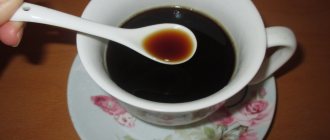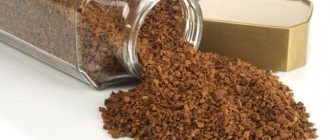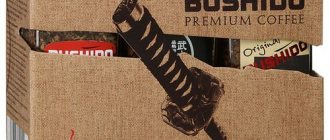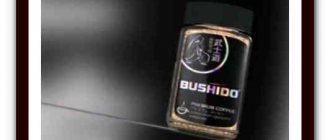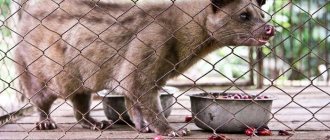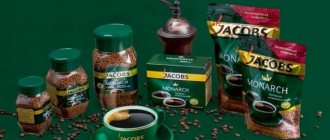The Bushido brand belongs to the Russian company Hors' Ltd. Despite this, Bushido coffee, as well as its official Internet portal, is designed in Japanese style. A large number of hieroglyphs and references to Eastern philosophy assure the potential buyer that the product belongs to Japanese industry. This design concept was developed by the German advertising agency Kakoii in order to increase customer interest in this brand’s coffee as an exotic premium product.
Brand uniqueness
Despite the symbolic Japanese name, Bushido brand products are manufactured in distant Switzerland. A unique grain processing technique and initial production were developed by Japanese craftsmen. For the first time, the company presented dissolved coffee under the Bushido brand.
Its production was designed for domestic consumers. At home, the product gained enormous popularity. Positive reviews about the impeccable taste of Bushido instant coffee forced the company's owners to expand the range and entrust the production of natural coffee to Swiss partners.
This country was not chosen by chance. Firstly, the Swiss climate is ideal for natural cooling of roasted beans with alpine mountain air, and secondly, local specialists are famous for their professionalism and thoroughness.
A special role is played by a professional master, who must carefully monitor the roasting process, adjusting the temperature at low levels so that the grains are roasted evenly. The mountain alpine cool helps preserve the drink's aromatic esters and a sufficient degree of moisture.
Wood roasted coffee
This mixture is produced at enterprises from Italy. Roasting takes place in wood-burning ovens. The fuel is oak, olive and orange trees.
Beans go through several stages during the roasting process:
- homogenization. This is to impart homogeneity to the substances contained in the grains. To do this, they are processed at a temperature of +60+100°C;
- drying at +100+150°C;
- Maillard reaction. This is the process of interaction between amino acids and sugar. Carried out at a temperature of +150+200°C;
- maturation. It is necessary to give the grains exceptional taste and aroma characteristics. Carried out at a temperature of +200+220°C;
- natural cooling up to +20°C.
Only the plant foremen know how these stages are combined and how long they take. And they don't reveal the secrets of making bushido coffee.
Mass markets offer three types of coffee of this brand:
- Bushido Delicato. The beans come from Colombia and Ethiopia. They are roasted over orange wood. The finished drink has a distinct fruity flavor and a light aroma of jasmine;
- Bushido Forte. Raw materials are supplied from Tanzania and Kenya. Roasting is carried out on oak logs. The finished coffee has a berry flavor, a smoky and citrus aroma. For this variety, only Arabica beans are taken;
Range
Initially, the Japanese brand Bushido produced only instant coffee, which consumers appreciated for its similarity to a natural drink and quick preparation.
In 2012, the company decided to produce premium ground and grain varieties, which consequently affected the price. Moreover, Japanese specialists have developed a line of products to satisfy the needs of any gourmet.
The popularity of Bushido is absolutely justified, because this brand was able to make even the instant drink upscale. In 2007, he was able to receive a gold medal at a Moscow exhibition in the innovative product category, and reviews of coffee from consumers themselves were entirely positive.
What do customers think, reviews?
Judging by reviews of Bushido coffee, the product is considered the most original and delicious product of its kind. Many coffee lovers noted that after trying this drink once, they could not return to their usual budget brands. They emphasized the richness, richness of taste and aroma. Many people are confused by the price, but consumers are willing to pay for a quality product.
There are also consumers who have not noticed the difference between Bushido coffee and other types of this product. They believe that the high cost is associated with a “loud” brand and say that it is much better and cheaper to purchase ground or bean coffee, which has higher taste and aroma characteristics.
Cereal Bushido
For those who like to make their own coffee drink, the company offers bean coffee of the same types as its ground counterpart. The original is made from elite Arabica varieties and is produced in limited quantities. Specialty is characterized by the fact that it is produced from beans of the same harvest, which gives the drink a rich, long-lasting aroma.
The Grand Cru blend is also available in grain form. Only Arabica beans are used for its production. The aroma of the drink made from freshly ground beans is persistent and rich. Brewed coffee has a chocolate aftertaste.
Another type of elite bean coffee is Specialty. Beans of one variety are roasted by hand. The product is distinguished by the presence of light bitterness, balanced by sourness. These characteristic features complement each other, helping to maximize the flavor richness of coffee beans. The product is made from Arabica beans.
Wood Roasted Coffee is considered a separate line of the Bushido brand
It is manufactured by order of the Horse company in Italy and is a natural bean coffee that is roasted using a special technology. Firewood is used for roasting. The products in this line include the following blends of varying strengths:
- Forte is tart coffee with a rich taste and bright aroma. For its preparation, various varieties of Arabica are used, grown in Kenya and Tanzania. The grains are roasted over oak wood.
- Delicato – characterized by a soft taste, the presence of a citrus aroma, and a sour aftertaste. Made from a mixture of Ethiopian and Colombian Arabica beans. The grains are roasted over orange wood, which gives the product a special spicy, subtle aroma.
- Intenso – coffee with a rich, juicy, nutty aftertaste. This product is made from 100% Arabica beans grown in Kenya and Colombia. The raw materials are fried using firewood from olive tree branches.
The design of the goods does not follow the Japanese style; only English and Russian descriptions are used on the packaging. At the same time, the quality of the product remains at a high level, and an individual approach to preparation increases interest in this brand.
Types of Bushido: red katana, black katana, light Katana
Due to high demand, the line is regularly updated. Types of Bushido coffee:
- ground;
- soluble;
- grain.
For a freeze-dried drink, they do not take the highest quality varieties - this is impractical. Bushido instant coffee is divided into types:
- Bushido red katana coffee. The granular product is made from Arabica beans in East America. Red katana is available in a bright red jar, 50 and 100g. Price – 300 rubles. Red is famous for its strength and astringency. The taste has wine notes, the smell is well preserved, and the aftertaste remains for a long time. One teaspoon is enough for two cups of coffee. Red katana is the most popular type among others: coffee lovers note its rich taste, lack of burnt smell, and say that it is better than others. You can buy red bushido at Magnit and Pyaterochka.
- Bushido black katana coffee. The Instant Original Blend is made from South and Central American beans that are roasted over open charcoal. Because of this, the drink has smoky, campfire notes. The highlight of the look is the light taste of plums and black bread. The packaging is black, the glass is transparent. You can buy glass jars of 50 and 100 grams. The price for 50 grams of bushido instant coffee is 190 rubles. Black katana is the strongest of all types, slightly bitter. Fans of Black Katana claim that it tastes like something straight out of a coffee shop.
- Light Katana Coffee is a light roast instant bushido blend with a fresh and pleasant taste. Jar with pink label. The beans are from Kilimanjaro plantations and have a strong aroma and subtle fruit accents. Unlike the black variety, the original Katana has slightly sour notes. Thanks to its light taste, you can drink it without adding sweeteners or milk formulas. The Katana variety won an award at a Russian exhibition. Available in cans of 50 and 100g. The price of a small glass jar is 240 rubles, with the promotion Katana 100g can be bought cheaper.
Secrets of production
The coffee producer Bushido is located on Swiss territory. The product is produced at the Haco Ltd plant, which produces coffee products. During production, coffee beans are uniformly roasted by hand.
Hot grains are cooled naturally with the help of one of the country's natural resources - the purest alpine air.
Bushido (Bushido) is a premium drink. Special methods are used in its production. Thus, roasting of beans for all types is done manually under the supervision of experts who do not allow the raw materials to be overcooked or undercooked. The coffee beans are then cooled using mountain air. The technology eliminates the use of liquid.
How to distinguish original coffee from fake
Often, when purchasing a can of coffee, the buyer doubts the authenticity of the product. What should you pay attention to in order to purchase a genuine product:
- First of all, you need to pay attention to the cost of the product. The price of quality coffee cannot be low.
- You should also take into account the fact that counterfeit goods are not packaged in expensive packaging. As a rule, manufacturers of counterfeit products pack products in transparent plastic jars.
- Pay attention to the packaging design. Manufacturers of well-known brands apply markings directly to the container.
- The packaging must indicate: barcode, country of origin, expiration date.
Price
Bushido brand coffee is an expensive product; the average price for 100 g of drink ranges from 400 to 700 rubles. The cost of Bushido Katana Gold is significantly higher than that of other types of these products, the approximate cost is 2000 rubles. Prices vary and depend on the quality of packaging, type of sale (wholesale or retail), and the percentage of discounts provided in retail trade. According to many buyers, cost is the only drawback of Bushido Group Ltd. products.
The drink has received recognition from buyers in many countries, who noted that the price of the product is worthy of its quality. Bushido brand coffee is made taking into account consumer requirements. A huge assortment provides fans with the opportunity to enjoy the varied and unusual flavors of the invigorating drink.
The drink has received positive reviews from customers, who note that the price of the product, given its quality, is quite affordable. The drink can be weak or strong, depending on the tastes of consumers. It's worth buying this coffee to experience the taste of a true Bushido original.
Japanese coffee traditions and features of Bushido
The Land of the Rising Sun is known for ancient Buddhist tea-making ceremonies and, unlike Europe and America, did not even import coffee until the 20th century. Now the situation has changed dramatically: coffee machines have been installed on city streets, although there are few coffee shops, as they are accustomed to in Europe and Russia, but in restaurants visitors are offered coffee no less often than tea.
The Japanese have developed their own preferences in choosing supplier countries and methods of preparing the drink. The most popular here is Jamaican coffee; beans are imported from Kenya, Guatemala and Brazil, but Japanese coffee lovers have only tasted Ethiopian and Tanzanian coffee in Bushido blends.
Espresso and cappuccino are not popular in Japan, so dark roast beans are not in demand here. To please the consumer audience, Bushido first presented freeze-dried coffee on the Japanese market, which can be used in all recipes, and only 10 years later, already in 2012, in beans and ground.
Although Japan is still far behind leaders Sweden and Finland in terms of coffee consumption—it is only in the second ten countries—the Japanese have developed their own coffee drinking culture, and the quality of the drinks they prepare can surprise even the most sophisticated coffee lovers.
And this is due to Bushido. The brand still managed to unite the traditions of East and West, bring their coffee cultures as close as possible and rally a new generation of coffee lovers around itself.
Bushido brand
In an attempt to connect East with West, Bushido coffee was born.
But this is not a product from Japan, as is commonly believed. The idea came to employees of the Russian company Horse. As a result, a concept was developed to create a trademark based on the Land of the Rising Sun. The products were supposed to combine the conservatism, quality, and originality of the East with the modernity of the West. The result was a line of products that met the stated requirements. There are relatively few varieties, but they differ from each other in their special zest and uniqueness. The manufacturer is Switzerland, where the secret of manufacturing the finished product is carefully hidden; only a few facts are known that indicate the uniqueness of the product. One of the lines is produced in Italy, the other in the Netherlands.
Bushido is modern coffee in convenient packaging with hieroglyphs on the label. There are natural grains, ground products and freeze-dried options, similar in taste to a drink brewed in a Turk. There are also gold products made under the influence of wood smoke.
Interesting Facts
The first shop with coffee, which was then called the “African potion,” appeared in Tokyo in 1881, was stylized as Parisian coffee shops, but was not popular with local residents and soon, having gone bankrupt, closed.
According to Euromonitor, today the country is one of the three largest importers of coffee - after the United States and the European Union, and ranks seventh in the top ten global retail markets.
Since 1995, popular coffee chains appeared in Japan - Starbucks, Doutor, Veloce, BECK's, and only after that the number of fans of the brewed drink began to grow.
Known for their passion for a healthy lifestyle, for centuries following a diet in which every calorie is accounted for and every carbohydrate is in place, the Japanese do not accept decaffeinated coffee. Therefore, Decaffeinato drink cannot be found in the country.
Japan has an official holiday - Coffee Day, which is celebrated on October 1st. And there is even a tradition of taking a bath with coffee on this day; famous bath complexes offer this service to clients.
